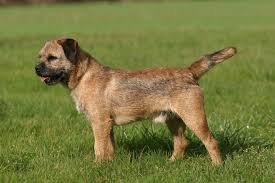
Border Terrier
Conditions of detention
Border Terriers are adaptable and can thrive in both urban and rural environments. They do well in apartments and houses alike, provided they receive regular exercise and mental stimulation.
Useful Fact: Their small size and moderate exercise needs make them well-suited for apartment living, but they still enjoy access to a yard or nearby parks for playtime.
Nutrition and diet
A balanced diet with high-quality dog food that includes proteins, fats, and carbohydrates is essential for Border Terriers. Fresh meat, vegetables, and grains can supplement their diet.
Useful Fact: Monitoring their food intake and providing appropriate portion sizes is important to prevent obesity and ensure they receive the right balance of nutrients.
Health
Border Terriers are generally healthy but can be prone to certain health issues such as hip dysplasia, allergies, and dental problems. Regular veterinary check-ups and maintaining a healthy diet are crucial.
Useful Fact: Regular dental care, including brushing and professional cleanings, is important to prevent dental disease, which they are prone to.
Grooming and care
The Border Terrier has a dense, wiry coat that requires regular grooming to prevent matting and tangling. Brushing several times a week and occasional hand-stripping are recommended.
Useful Fact: Their coat is relatively low-maintenance but benefits from regular grooming to keep it in good condition and manage shedding.
Education and training
Border Terriers are intelligent and eager to please, making them relatively easy to train. Early socialization and consistent, positive reinforcement training methods are crucial.
Useful Fact: They respond well to training that includes a variety of activities and challenges, keeping them mentally stimulated and engaged.
Toys and entertainment
Interactive toys, puzzle games, and activities that involve hunting and retrieving are excellent for keeping a Border Terrier mentally and physically stimulated.
Useful Fact: They enjoy games that challenge their intelligence and agility, reflecting their playful and energetic nature.
Safety
A secure, fenced yard is important for Border Terriers to prevent them from wandering off. Supervision during outdoor activities is recommended due to their small size and potential vulnerability.
Useful Fact: Their strong prey drive means they should be supervised around small animals and kept on a leash in unsecured areas.
Accessories
Sturdy collars and leashes, comfortable bedding, grooming tools, and interactive toys are essential accessories for a Border Terrier. Crate training can also be beneficial for travel and safety.
Useful Fact: Reflective gear enhances safety during evening or early morning walks, making them more visible to others.
Socialization
Early and ongoing socialization with other dogs, animals, and people is important for Border Terriers. It helps them develop a well-rounded temperament.
Useful Fact: Regular socialization helps prevent shyness or aggression and ensures they are friendly and adaptable in various situations
Travel and Transportation
Border Terriers can adapt to travel if introduced gradually. Secure crates or harnesses in vehicles ensure their safety during trips.
Useful Fact: Their small size makes them convenient for travel, but ensuring their comfort and safety during trips is crucial.
Behavior and psychology
Border Terriers are known for their affectionate, playful, and loyal nature. They require regular mental and physical stimulation to prevent boredom and destructive behavior.
Useful Fact: Their strong bond with their family makes them excellent companions, but they can exhibit some independence due to their hunting background.
Legal aspects
Owners should be aware of local regulations regarding pet ownership, including licensing, leash laws, and specific breed regulations.
Useful Fact: Keeping vaccination records and adhering to local pet laws ensures the safety and legality of owning a Border Terrier.


